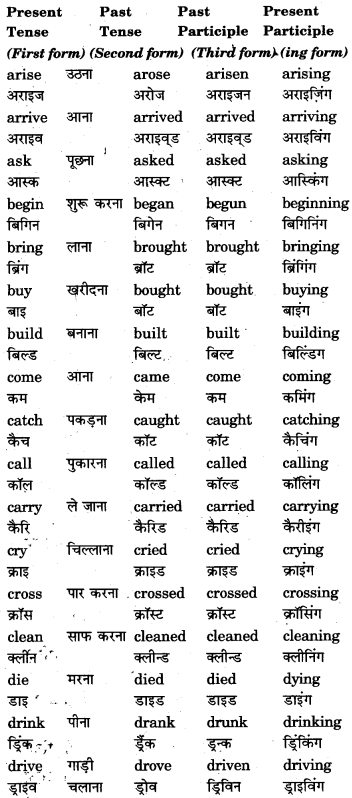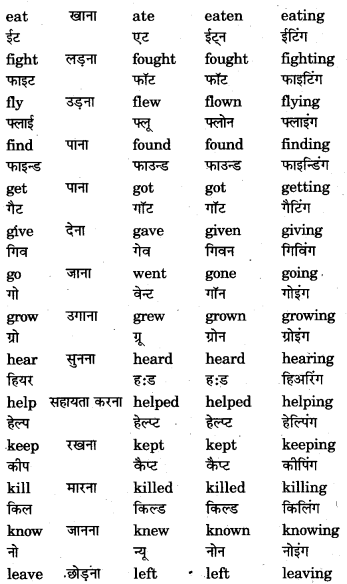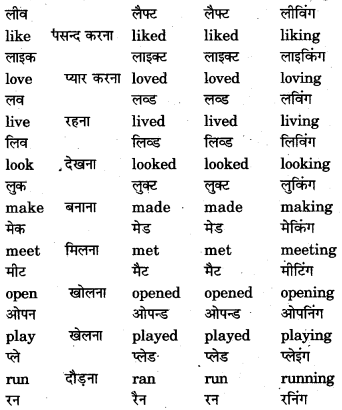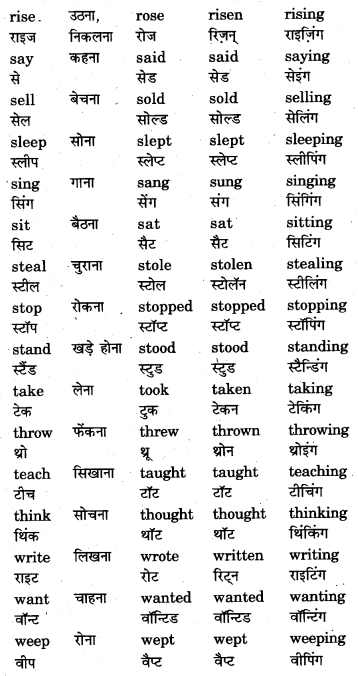RBSE Class 5 English Grammar Tenses
Rajasthan Board RBSE Solutions for Class 5 English Grammar Tenses Questions and Answers.
RBSE Class 5 English Grammar Tenses
अंग्रेजी के ठोस ज्ञान के लिए सबसे पहले Tenses का ज्ञान होना अत्यन्त आवश्यक है। Tense, Verbs का वह रूप होता है जो कि कार्य का समय बताता है, जैसे. He goes. (वर्तमान काल) He went. (भूत काल) He will go. (भविष्यत् काल) अंग्रेजी में मुख्य रूप से तीन काल (Tenses) होते
(A) Present Tense (वर्तमान काल)
(B) Past Tense (भूत काल)
(C) Future Tense (भविष्यत् काल)। प्रत्येक Tense के चार भाग होते है
(i) Indefinite
(ii) Continuous
(iii) Perfect
(iv) Perfect Continuous.

यहाँ पर Tense के निम्नलिखित चार प्रकार का ही वर्णन दिया जा रहा है
1. Present Indefinite Tense
2. Present Continuous Tense
3. Past Indefinite Tense
4. Future Indefinite Tense.
Tense का अध्ययन करने से पूर्व Verb (क्रिया) के बारे में जानना अति आवश्यक होता है। वाक्य का सबसे आवश्यक अंग verb होता है। यह किसी काम के होने या करने का बोध कराता है। verb के मुख्य रूप से तीन रूप होते हैं : Present, Past तथा Past Participle. इनके अतिरिक्त Verb की first form के अन्त में --ing लगाने से Present Participle form बनती है। यहाँ पर कुछ महत्त्वपूर्ण verbs की चार forms दी जा रही हैं जिन्हें आपको अच्छी तरह से याद कर लेना चाहिए।
Forms of Verbs
(क्रिया के रूप)







1. The Present Indefinite Tense
(A) Affirmative Sentences :
(स्वीकारात्मक वाक्य)
Pattern-Subject + V की I form या V की I forms + s/es
(i) I go home.
(ii) We go home.
(iii) You go home.
(iv) He goes home.
(v) She goes home.
(vi) Radha goes home.
(vii) They go home.
(viii) It goes home.
नियम 1.I, We, You, They तथा बहुवचन कत्ताओं के साथ Verb की I form का प्रयोग किया जाता है। देखिये वाक्य (i), (ii), (iii) तथा (vii)]
नियम 2. He, She, It तथा एकवचन कर्ताओं के साथ Verb की I form में s/es का प्रयोग किया जाता है। [देखिये वाक्य (iv), (v), (vi) तथा (viii)] Verb के साथ s/es लगाने का
नियम (a) जिन verbs के अन्त में sh, ch, x, ss, o या zz होता है तो उनके साथ es लगाते हैं, जैसेpush pushes cross crosses fix fixes bush bushes catch catches go goes
(b) यदि Verb के अन्त में y हो व y के पूर्व व्यंजन (a, e, i, o, u को छोड़कर) हो तो y हटाकर ies लगाते हैं, जैसे worry - worries, carry - carries
(c) शेष verbs के साथ केवल s लगाते हैं, जैसेplay-plays ; eat-eats.

(B) Negative Sentences (नकारात्मक वाक्य)
Pattern-subject + do not does not + V की I form....
(i) I do not go home.
(ii) We do not go home.
(iii) He does not go home.
नियम 1. वाक्य को नकारात्मक बनाने के लिए do not/does not का प्रयोग किया जाता है। verb की I form में s/es नहीं लगाया जाता है।
नियम 2. He, She, It तथा एकवचन कर्ताओं के साथ does not का प्रयोग किया जाता है।
(C) Interrogative Sentences (प्रश्नवाचक वाक्य)
Pattern-Do/Does + Subject + Verb की । form.....?
(i) Do I go home?
(ii) Do we go home ?
(iii) Does he go home ?
नियम 1. वाक्य को प्रश्नवाचक बनाने के लिए subject के पूर्व Do/Does का प्रयोग किया जाता है। वाक्य के अन्त में प्रश्नवाचक चिह्न (?) का प्रयोग किया जाता है तथा Verb में s/es नहीं लगाया जाता
नियम 2. He, She, It तथा एकवचन कर्ताओं के साथ Does का प्रयोग किया जाता है।
नियम 3. I, We, You, They तथा बहुवचन कर्ताओं के साथ Do का प्रयोग किया जाता है। प्रयोग इस Tense का प्रयोग वर्तमान समय में होने वाले कार्य, आदत, सामान्य सत्य शाश्वत सत्य जैसी
बातों का उल्लेख करने के लिए किया जाता है।
जैसे
1. He plays. वह खेलता है। (कार्य)
2. He comes here everyday. वह यहाँ पर प्रतिदिन आता है। (आदत)
3. The sun rises in the east. सूर्य पूर्व में उगता है। (शाश्वत सत्य)
Exercise 1 (From Let's Learn English)
Fill in the blanks using Present Indefinite form of the verbs given in the brackets :
कोष्ठक में दी गई क्रियाओं के Present Indefinite के सही रूपों से रिक्त स्थानों की पूर्ति कीजिए
1. The truth ........... (make) us free.
2. They ............ (see) many people in the park.
3. Pranayam ......... (slow) down heart rate.
4. Raju .......... (blame) Manjeet.
5. Dussehra ........... (occur) on the tenth date of Ashwin month.
6. Rohit ......... (wander) here and there.
7. The peacock .........(dance) in the field.
Answers:
1. makes
2. see
3. slows
4. blames
5. occurs
6. wanders
7. dances.

2. The Present Continuous Tense वाक्य रचना
(A) Affirmative Sentences: (स्वीकारात्मक वाक्य)
Pattern-Subject + islam/are + Verb की ing form......
(i) I am going home.
(ii) We are playing.
(iii) You are reading.
(iv) He is singing.
(v) She is dancing.
नियम 1. He, She, It तथा एकवचन कर्ताओं के साथ is' लगाकर Verb की ing form का प्रयोग किया जाता है। (देखिए वाक्य (iv) व (v))
नियम 2. You, We, They तथा बहुवचन कर्ताओं के साथ 'are' लगाकर Verb की ing form का प्रयोग किया जाता है। (देखिए वाक्य (ii) व (iii))
नियम 3. I के साथ 'am' लगाकर Verb की ing form का प्रयोग किया जाता है। (देखिए वाक्य (i))
(B) Negative Sentences (नकारात्मक वाक्य):
Pattern-Subject + is/am/are + not + Verb की ing form + ....... (i) I am not playing. (ii) We are not reading. नियम वाक्य को नकारात्मक बनाने के लिए is/am/ are के ठीक बाद not का प्रयोग किया जाता है।
(C) Interrogative Sentences :
(प्रश्नवाचक वाक्य) Pattern-Is/Am/Are + subject + Verb की ing form..........?
(i) Am I reading ?
(ii) Are we playing ?
(iii) Is he calling you? नियम वाक्य को प्रश्नवाचक बनाने के लिए is/am/
are का प्रयोग subject के पूर्व किया जाता है तथा | वाक्य के अन्त में प्रश्नवाचक चिहन (?) का प्रयोग किया जाता है।
प्रयोग इसका प्रयोग ऐसे कार्यों को व्यक्त करने के | लिए किया जाता है जो कि वर्तमान में चल रहे हों, जैसे
(i) I am watching TV. मैं टीवी देख रहा हूँ।
(ii) The dog is barking: कुत्ता भौंक रहा है।

Exercise 2. (From Let's Learn English)
Fill in the blanks using Present
Continuous form of the verbs given in the brackets:
कोष्ठक में दी गई क्रियाओं का Present Continuous Tense में प्रयोग करते हुए रिक्त स्थानों की पूर्ति कीजिए :
1. Shivam and Nitan .......... (learn) Pranayam.
2. Some people ......... (run) on the track.
3. The rats ........... (play)
4. We ............ (clean) our school.
5. He .......... (take) his dinner.
6. The stars ........... (twinkle) brightly.
7. The cranes ........... (fly) in the sky.
Answers:
1. are learning,
2. are running,
3. are playing,
4. are cleaning,
5. is taking,
6. are twinkling,
7. are flying.
3. The Past Indefinite Tense वाक्य रचना
(A) Affirmative Sentences :
(स्वीकारात्मक वाक्य) Pattern-Subject + Verb की II form......
(i) I wrote a letter.
(ii) We played well.
नियम–सभी subjects के साथ verb की II form का प्रयोग किया जाता है।
(B) Negative Sentences (नकारात्मक वाक्य) Pattern-Subject+did not+Verb की I form.....
(i) I did not go home.
(ii) We did not run fast. नियम वाक्य को नकारात्मक बनाने के लिए did not + verb की I form का प्रयोग किया जाता है।
(C) Interrogative Sentences
(प्रश्नवाचक वाक्य) Pattern-Did + subject + Verb की I form...?
(i) Did I read a story?
(ii) Did he seil books? नियम वाक्य को प्रश्नवाचक बनाने के लिए Did को Subject के पहले रखते हैं, क्रिया की I form का प्रयोग करते हैं तथा वाक्य के अन्त में प्रश्नवाचक चिह्न (?) का प्रयोग किया जाता है।
प्रयोग - इसका प्रयोग ऐसे कार्यों को व्यक्त करने के लिए किया जाता है जो भूतकाल में पूरा हो चुका है।
(i) You wrote a letter. तुमने एक पत्र लिखा।
(ii) We played well. हम अच्छा खेले।

Exercise 3.
(From Let's Learn English)
Fill in the blanks using Past form of the verbs given in the brackets :
निम्नलिखित वाक्यों में रिक्त स्थानों की पूर्ति Verb की Past form से कीजिए
1. L........... (throw) them into the dustbin.
2. We ........... (help) our father at the shop.
3. She .......... (drink) milk in the morning.
4. Ravan ........... (take) Sita to Lanka.
5. The peacock ........... (not play) with Rohit.
6. Ram ........... (shoot) arrows at the - effigies.
7. He ........... (hear) the sad cries of the genie.
Answers:
1. threw,
2. helped,
3. drank,
4. took,
5. did not play,
6. shot,
7. heard.
4. The Future Indefinite Tense
(A) Affirmative Sentences :
(स्वीकारात्मक वाक्य) Pattern-Subject + will/shall + Verbot I form....
(i) I shall help you.
(ii) We shall go home.
(iii) He will call you.
(iv) They will come late.
नियम 1. I तथा We के साथ shall + verb की I form का प्रयोग किया जाता है।
नियम 2. I तथा We को छोड़कर शेष सभी कर्ताओं के साथ will + verb की I form का प्रयोग किया जाता है।
(B) Negative Sentences : (नकारात्मक वाक्य)
Pattern-Subject +will/shall + not + Verb की I form........
(i) I shall not go.
(ii) She will not go.
नियम वाक्य को नकारात्मक बनाने के लिए shall/ will के साथ not का प्रयोग किया जाता है।
(C) Interrogative Sentences :(प्रश्नवाचक वाक्य)
Pattern-Shall/Will + Subject + Verb की I form + .......?
(i) Shall we go home ?
(ii) Will she come here?
नियम वाक्य को प्रश्नवाचक बनाने के लिए Shall/Will को subject के पूर्व तथा वाक्य के अन्त में प्रश्नवाचक चिह्न (?) का प्रयोग किया जाता है।
प्रयोग - इस Tense के वाक्यों में काम का होना या करना भविष्य काल में पाया जाता है, जैसेI shall write a letter. मैं एक पत्र लिखंगा।

Exercise 4 (From Let's Learn English)
Fill in the blanks using future form of the verb:
रिक्त स्थानों की पूर्ति Verb की Future form से कीजिए:
1. She ............. (help) her mother in the kitchen.
2. I............. (do) it myself.
3. He ............. (remove) the cobwebs from the wall.
4. This ............. (impact) Rohit greatly.
5. They ............. (not touch) any item.
6. I............. (tell) my elephants to take the other route.
7. They ............. (make) different poses.
Answers:
1. will help,
2. shall do,
3. will remove,
4. will impact,
5. will not touch,
6. shall tell,
7. will make.
Exercise 5 (From Let's Learn English)
(Mixed Sentences)
Fill in the blanks using present, past or future forms of the verbs given in the brakcets:
रिक्त स्थानों की पूर्ति कोष्ठक में दिये गए verbs की present, past या Futures forms से कीजिए
1. Shivam ........... (wonder) what they were doing.
2. Pranayam ......... (slow) down our heart rate.
3. Gajraj ........... (accept) the request and told the elephants to take another way.
4. Manjeet, you are ........... (tell) a lie.
5. He thought that they were (admire) his new car.
6. They have wonderful minds but they .......... (not want) to listen to spiritual masters.
7. Ramlila ........... (describe) the story of Ram in the form of a drama.
8. Last week, I .......... (go) to Chittorgarh.
9. They .......... (do) this work tomorrow.
10. One day, a lonely boy named Pankaj .......... (find) the magic lamp.
Answers:
1. wondered,
2. slows,
3. accepted,
4. telling,
5. admiring,
6. do not want,
7. describes,
8. went,
9. will do,
10. found.

Exercise 6 (From Let's Learn English).
Fill in the blanks with the 'past form of the verbs given in brackets:
(verbs) का प्रयोग कर रिक्त स्थानों को भरें
1. Shivam and Nitin got interested and ................. the group. (Goin)
2. He accepted the request and ................. the elephants to take the other way. (tell)
3. They thanked the rats and also ........... sorry for making fun of their small size. (feel)
4. He started the car and ... move. (begin)
5. Nitish ............... to Jaipur yesterday.(go)
6. Abdul ................ a letter to his father. (write)
7. Meena ................ her homework before going to bed. (complete)
8. The traffic police .............. the bus because the driver did not care for the traffic lights. (stop)
9. David ............... a beautiful paper boat. (make)
10. Zamila ............. Poonam why she was late that day. (ask)
Answer:
1. joined,
2. told,
3. felt,
4. began,
5. went,
6. wrote,
7. completed,
8. stopped,
9. made,
10. asked.
Exercise 7.
Choose the correct words given in brackets to complete the sentences:
कोष्ठक में दिए शब्दों में से सही शब्द चुनकर वाक्यों को पूरा कीजिए :
1. When I was doing my homework, my friend ................ to meet me. (comes/came)
2. We live here and ............... in a friendly atmosphere.(study/studied)
3. Who ................ your sister's homework ? (completes/complete)
4. Ramleela..............the story of Ram. (discribing/describes)
5. Children...............in many ways. (enjoy/enjoys)
6. They are ............. something. (do/doing)
7. Now I .............. also do my work. (are/will)
Answers:
1. came,
2. study,
3. completes,
4. describes,
5. enjoy,
6. doing,
7. will.

Exercise 8.
Choose the correct words given in brackets to complete the sentences:
कोष्ठक में दिए शब्दों में से सही शब्द चुनकर वाक्यों को पूरा कीजिए:
1. Madam, I will stop chewing gutkha. I ............... cancer. (don't want/didn't want)
2. Do your teeth ................? (ache/are aching)
3. Look over there ! The cow now. (is grazing/grazes)
4. Do not cross the road at the red light, otherwise the police ................ you. (will fine/shall fine)
5. I always................to play in the evening. (go)
6. My Headmaster ............ my parents yesterday.
7. Nidhi is packing. She is .......... to Ajmer today. (go)
8. Mr Chopra is a very rich person. He usually ............ the poor. (help)
9. Aruna likes fruits but I ............ fruit. (not like)
10. He is a teacher. He is ............ Hindi now. (teach)
Answers:
1. don't want,
2. ache,
3. is grazing
4. will fine,
5. go,
6. called,
7. going,
8. helps,
9. do not like,
10. teaching.
